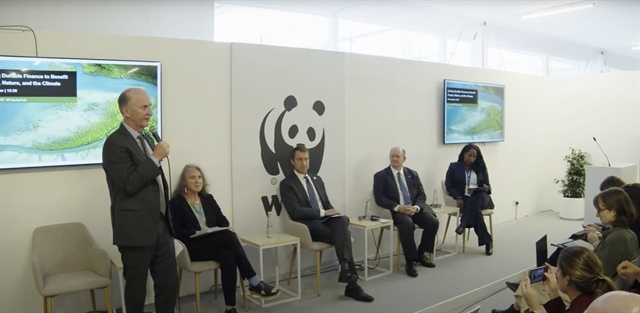 Society
Society

 |
| Carter Roberts, WWF-US’s CEO, speaks at the COP28 side event to highlight the potential of durable finance to benefit people, nature and climate. Photo courtesy of WWF |
ĐÀ NẴNG – “Anyone who thinks the ongoing environmental crisis is just about climate change would be missing a whole lot,” Carter Roberts, WWF-US’s CEO, told US and Vietnamese leaders at a COP28 side event highlighting the potential of durable finance to benefit people, nature and climate.
The event, organised by WWF-US, highlighted how the U.S. Government is helping unlock innovative, durable finance for nature and climate, working with partner governments, NGOs, multilateral institutions and the private sector.
The discussions particularly focused on how to drive large-scale public-private finance efforts that conserve biodiversity, mobilise nature-based solutions to climate change, and provide sustainable economic benefits for indigenous peoples and local communities.
“We’re here because we are concerned, we are engaged and we’re ready to take action. There are many reasons for this. We are in a crisis with severe weather events such as wildfires, extreme storms, flooding and droughts. We’re in a crisis situation for our environment. It’s our national Security,” said US Senate Foreign Relations Committee Chairman Ben Cardin.
“I am proud of what the United States has been able to do, for example the inflation reduction act that passed and is making a huge difference to investment in solutions to our climate challenges, or from the Millennium Challenge Corporation, that has an investment in excess of US$8.5 billion.
“We’re going to take stock at COP28 and it will tell us that we are not on target yet to reach the 1.5 goal. We’ve got to do more, all of us together,” Cardin emphasised.
For Việt Nam, WWF had implemented successful conservation models and many of them would be scaled up and multiplied in the coming time, Phạm Quang Huy, Counsellor for Agricultural Affairs, Việt Nam’s Embassy in Washington D.C, highlighted at the event.
“These works focus on conserving the largest forest areas and the most unique biodiversity in Central Việt Nam. A holistic and systematic approach is applied by WWF to improving protected area management, protecting wildlife and improving livelihoods of local communities.
“Some milestones have been achieved including 20,000 snares removed in one year alone, 1,000 people improved their income through livelihood initiatives. By the end, the project aims at improving the management of 600,000ha of forest and it has already achieved 550,000ha,” Huy said.
“Another big USAID-supported project, Saving Threatened Wildlife, focuses on biodiversity loss and wildlife trafficking. It works with the government, private sector and civil society to build leadership against wildlife trafficking and reduce demand for wildlife products.
“Working at the national level to raise awareness, political and private sector support on environmental and health risks associated with the illegal wildlife products are part of the project’s focus. These efforts are helping Việt Nam support global and national biodiversity commitments that contribute to ecological resilience and ultimately pave the way for a more prosperous future.”
At the event, Huy also highlighted the visit of President Joe Biden last September to Hà Nội where he announced the elevation of the two countries’ bilateral relationship to a Comprehensive Strategic Partnership.
In the joint agreement, the two leaders recognised the importance of collaborative action to promote climate-smart agriculture, biodiversity conservation, low emissions and resilience of vulnerable communities.
“The challenges of climate change and the loss of biodiversity are intertwined. How we address these crises will ultimately decide the fate of our home, planet Earth. And it is true that governments play a key role, so do civil society and communities,” Carter emphasised.
Handling wildlife violations
A training session on handling wildlife violations and a mock trial adjudicating a wildlife crime case was organised for law enforcement and judicial agencies in Lào Cai Province by the Saving Threatened Wildlife project, funded by the USAID, in collaboration with the Forest Protection Department (FPD), Ministry of Agriculture and Rural Development.
More than 70 representatives from national and provincial government offices participated in the training, including law enforcement and judicial agencies, as well as other offices such as Provincial FPD, Provincial People’s Procuracy, Provincial People’s Court, Lào Cai Customs, Provincial Police, Border Guard Command, Department of Market Surveillance and Department of Civil Judgement Enforcement.
The project focuses on supporting capacity building and enhancing inter-agency coordination for Việt Nam’s law enforcement and judicial officers, especially for local agencies, in the process of investigating, prosecuting, and adjudicating violations of wildlife management and protection.
“Lào Cai is a pioneering province in inter-agency coordination and this model will be replicated nationwide”, said Trần Thị Nam Hà, Deputy Director of the Central Project Management Unit of the Saving Threatened Wildlife project.
As highlighted by the 2019 sentencing of rhino horn traffickers by the Lào Cai City People’s Committee, and the recent capture of four wallabies in Cao Bằng province, border areas are susceptible to wildlife trafficking. However, border points can also provide strategic opportunities to intercept these illegal activities.
Recognising these opportunities, the FPD and provincial authorities of Lào Cai Province, an area bordering China with a high volume of cross-border trade and tourism, convened the enforcement and judicial training.
The training is expected to improve knowledge and skills for officers in the fields of investigation, prosecution, adjudication and resolution of violations and crimes related to wildlife. VNS




